- Home
- Cecelia Ahern
The Gift Page 12
The Gift Read online
Page 12
Lou simply nodded and left the room, his knees and legs shaking with his every step. At the elevators, he held on to the wall as he tried to catch his breath and let the dizziness subside. The elevator doors opened and he fell inside, thumping the ground-floor button before hunkering down in the corner of the space, moving farther and farther away from himself on the fourteenth floor.
At eight p.m., as Lou was in the boardroom of the Patterson Development offices negotiating with Arthur Lynch, Lou entered the restaurant just as Alfred and the team of men were being led to their tables. He offered his cashmere coat to the host, adjusted his tie, smoothed down his hair, and made his way to the tables, one hand in his pocket, the other swinging by his side. His body was loose again, nothing rigid, nothing contained. In order to function he needed to feel the swing of his body, the casual motion of a man who personally doesn’t care about the decision either way, but who would do his best to convince you otherwise, because his only concern is you.
“Pardon me, gentlemen, for being a little delayed,” he said smoothly to the men whose noses were already buried deep in their menus.
They all looked up, and Lou was exceptionally happy to see the expression on Alfred’s face: a wave of emotions ranging from surprise to disappointment to resentment to anger. Each look told Lou that this mix-up had indeed been planned by Alfred. Lou made his way around the table greeting the dinner guests, and by the time he reached Alfred, his coworker had regained his smug face.
“Patterson is going to kill you,” Alfred spoke quietly from the side of his mouth. “But at least one deal will be done tonight. Welcome, my friend.” He shook Lou’s hand, his anticipation of Lou’s sacking tomorrow lighting up his face.
“It’s all been taken care of,” Lou simply replied, turning to take his place a few seats away.
“What do you mean?” Alfred asked harshly, for a moment forgetting where he was, his tight grip around Lou’s arm preventing him from moving away.
Lou looked around at the table and smiled, then leaned down and discreetly removed each of Alfred’s fingers from his arm. “I said, it’s all been taken care of,” Lou repeated.
“You canceled the conference call? I don’t get it.” Alfred smiled nervously. “Let me in on it.”
“No, no, it’s not canceled. Don’t worry, Alfred, let’s pay our guests some attention now, shall we?” Lou flashed his pearly whites and finally moved to his chair. “Now, gentlemen, what looks good on this menu? I can recommend the foie gras; I’ve had it here before, and it’s a treat.” He smiled at the team and immersed himself in the pleasure of deal making.
At nine twenty p.m., after the visual conference call with Arthur Lynch, an exhausted yet exhilarated and triumphant Lou stood outside the window of the Saddle Room restaurant. He was wrapped up in his coat as the December wind picked up, his scarf tight around his neck, yet he didn’t feel the cold as he watched himself through the window, suave and sophisticated and holding everyone’s attention as he told a story. Everybody’s face was interested, all but Alfred, and after five minutes of his animated hand gestures and facial expressions, all the men started laughing. Lou could tell from his body movements that he was telling the story of how he and his colleagues had wandered into what turned out to be a gay bar in London instead of the lap-dancing bar they had expected. Looking at himself telling the story, he decided then and there never to tell it again. He looked like a prat.
He felt a presence beside him, and he didn’t need to turn around to know who it was.
“You’re following me?” he asked, still watching through the window.
“Nah, just figured you’d come here,” Gabe responded, shivering and stuffing his hands into his pockets. “How are you doing in there? Entertaining the crowd as usual, I see. Ah, it’s the one about the three blondes in the elevator. You do like telling that joke, don’t you?”
“What’s going on, Gabe?”
“Busy man like you? You got what you wished for. Now you can do everything. Mind you, it’ll wear off by the morning, so watch out for that.”
“Which one of us is the real me?”
“Neither of you, if you ask me.”
Lou finally turned to look at him then, and frowned. “Enough of the deep insights, please. They don’t work on me.”
Gabe sighed. “Both of you are real. You both function as you always do. You’ll eventually merge back into one and be as right as rain again.”
“And who are you?”
Gabe rolled his eyes. “You’ve been watching too many holiday movies. I’m Gabe. The same guy you dragged off the streets.”
“What’s in these?” Lou took the pills out of his pocket. “Are they dangerous?”
“Just a little bit of insight. And that never killed anyone.”
“But these things…you could make some real money. Who else knows about them?”
“All the right people — the people who made them — and don’t you go trying to make a fortune off them, or you’ll have a few serious people to answer to.”
Lou backed off for the moment. “Gabe, you can’t just double me up and then expect me to accept it without question. This could have dire medical consequences for me, not to mention life-changing psychological reactions. And the rest of the world really needs to know about this. This is insane! We really need to talk about this — I need to know much more.”
“Sure, we will.” Gabe studied him. “And then, when you tell the world, you’ll either be locked up in a padded cell or you’ll become a freak-show act, and every day you can read about yourself in exactly the same amount of column inches as Dolly the cloned sheep. If I were you, I’d just keep quiet about it all and make the best of a very fortunate situation.” He paused. “Wait, you’re very pale. Are you okay?”
Lou laughed hysterically. “No, I’m not okay! This is not normal. Why are you behaving like this is normal?!”
Gabe shrugged. “I’m just used to it, I guess.”
“Used to it?” Lou asked, bewildered. “Then you tell me, where do I go now?”
“Well, you’ve taken care of business at the office, and it looks like your other half is taking care of business here.” Gabe smiled. “That would leave one special place for you to go.”
Lou thought about that, and then a smile slowly crawled onto his face as he finally understood Gabe for the first time that evening. “Okay, let’s go.”
“I think Ruth would rather you come home alone tonight,” Gabe said. “She liked me, but she didn’t like me that much.”
“What the hell are you talking about? I’m not going home. Let’s go to the pub. We have to celebrate.”
Gabe stared at him.
“What’s wrong?”
“Go home, Lou.”
“Home?” Lou scrunched up his face. “Why would I do that? You’ve just given me a free ticket to stay out late. He can bloody well go home.” He turned back to watch himself at the dinner table, launching into yet another story. “Oh, I’m telling the one about the time I was stranded in the Boston airport. There was this woman on the same flight as me…” He grinned, turning around to tell Gabe the story, but his friend was gone.
“Suit yourself,” Lou mumbled. He watched himself for a little bit longer, still in shock and unsure whether he was really experiencing this night. He definitely deserved a pint, and if the other half of him was heading home after the dinner, that meant he could stay out all night and nobody would notice — nobody, that was, but the person he ended up with. Happy days.
CHAPTER 17
Lou Meets Lou
A TRIUMPHANT LOU ROLLED UP to his home, gratified by the sound of the gravel beneath his wheels and the sight of his electronic gates closing behind him. The dinner meeting had been a success: he had commanded the conversation and had done some of the best convincing, negotiating, and entertaining he’d ever done. They’d laughed at his jokes, all his best ones, and they’d hung on his every word. All the gentlemen had left the table content and i
n full agreement. He’d shared a final drink with an equally jubilant Alfred before driving home.
The lights in the downstairs rooms were out, but they were all on upstairs, despite this late hour, bright enough to help land a plane.
He stepped inside, into the blackness. Ruth usually left the entrance-hall lamp on, and he felt around the walls for the light switch. There was an ominous smell in the air.
“Hello?” he called. His voice echoed three flights up to the skylight in the roof.
The house was a mess, not the usual tidiness that greeted him when he came home. Toys were scattered around the floor. He tutted.
“Hello?” He made his way upstairs. “Ruth?”
He waited for her shushing to break the silence, but it didn’t.
Instead, once he reached the landing, Ruth ran from Lucy’s bedroom and dashed by him, hand over her mouth, eyes wide and bulging. She hurried into their bathroom and closed the door. This was followed by the sound of her vomiting.
Down the hall, Lucy started to cry and call for her mother.
Lou stood in the middle of the landing, looking from one room to the other, frozen on the spot.
“Go to her, Lou,” Ruth just about managed to say before another encounter with the toilet bowl.
He was hesitant, and Lucy’s cries got louder.
“Lou!” Ruth yelled, more urgently this time.
He jumped, startled by her tone, and made his way to Lucy’s room. He slowly pushed open the door and peeked inside, feeling like an intruder as he entered a world he had never ventured into before. The smell of vomit was pungent inside. Her bed was empty, but her sheets and pink duvet were unkempt from where she’d been sleeping. He followed her sounds into the bathroom and found her on the tiles, bunny slippers on her feet, throwing up into the toilet. She was weeping quietly as she did so. Spitting and crying, crying and spitting, her sounds echoing into the base of the toilet.
Lou stood there, looking around, briefcase still in his hand, unsure of what to do. He took a handkerchief out of his pocket and covered his nose and mouth, both to block the smell and to prevent the infection from spreading to him.
Ruth returned, much to his relief, and noted him just idly standing by and watching his five-year-old daughter being ill, then barged by him to tend to her.
“It’s okay, sweetheart.” Ruth fell to her knees and wrapped her arms around her daughter. “Lou, I need you to get me two damp facecloths.”
“Damp?”
“Run them under some cold water and wring them out so they’re not dripping wet,” she explained calmly.
“Of course, yes.” He shook his head at himself. He wandered slowly out of the bedroom, then froze once again on the landing. Looked left, looked right. He returned to the bedroom. “Facecloths are in the…?”
“Hall closet,” Ruth said.
“Of course.” He made his way to the closet and, with his briefcase still in hand and his coat on, fingered the various colors of facecloths inside. Brown, beige, or white. He couldn’t decide. Choosing brown, he returned to Lucy and Ruth, ran them under the tap, and handed them to her, hoping what he’d done was correct.
“Not just yet,” Ruth explained, rubbing Lucy’s back as her daughter took a break.
“Okay, erm, where will I put them?”
“Beside her bed. And can you change her sheets? She had an accident.”
Lucy started to weep again, tiredly nuzzling into her mother’s chest. Ruth’s face was pale, her hair tied back hastily, and her eyes tired, red, and swollen. It seemed it had already been a hectic night.
“The sheets are in the closet, too. And the Dioralyte is in the medicine cabinet in the utility room.”
“The what?”
“Dioralyte. Medicine. Lucy likes the black-currant flavor. Oh God,” she said, jumping up, hand over her mouth, and running down the hall to their own bathroom again.
Lou was left in the bathroom alone with Lucy, whose eyes were closed as she leaned up against the bathtub. Then she looked at him sleepily. He backed out of the bathroom and started to remove the soiled sheets from her bed. As he was doing so, he heard Bud’s cries from the next room. He sighed, finally put down his briefcase, took off his coat and suit jacket, and threw them out of the way, into the Dora the Explorer tent in the corner of Lucy’s room. He opened the top button of his shirt, loosened his tie, and rolled up his sleeves.
LOU STARED DEEP INTO HIS Jack Daniel’s and ice and ignored the barman, who was leaning over the counter and speaking aggressively into his ear.
“Do you hear me?” the barman growled.
“Yeah, yeah, whatever.” Lou’s tongue stumbled over his words, already unable to remember what he’d done wrong.
“No, not whatever, buddy. Leave her alone, okay? She doesn’t want to hear your story; she is not interested in you. Okay?”
“Okay, okay,” Lou grumbled then, remembering the rude blonde at the bar who’d kept ignoring him. He’d happily not talk to her — he wasn’t getting much conversation out of her anyway — and the journalist he’d just shared a drink with earlier didn’t seem much interested in the amazing story that was his life. He kept his eyes down into his whiskey. A phenomenon had occurred tonight, and nobody was interested in hearing about it. Had the world gone mad? Had they all become so used to new inventions and scientific discoveries that the very thought of a man being cloned no longer had shock value? No, the young occupants of this trendy bar would rather sip away at their cocktails, the young women swanning about in the middle of December with their tanned legs, short skirts, and highlighted hair, designer handbags hooked over their arms like candelabras, each one looking as exotic and as at home as a coconut in the North Pole. They didn’t care about the greater events of the country. A man had been cloned. There were two Lou Sufferns in the city tonight. Bilocation was a reality. He alone knew the great depths of the universe. He laughed to himself and shook his head at the hilarity of it all.
He felt the barman’s stare still searing into him, and so he stopped his solo chortling and concentrated again on his ice. Around the lonesome Lou the noise continued, the sound of people being with other people: after-work flirting, after-work fighting. There were tables of girls huddled together with eyes locked in as they caught up with one another, circles of young men standing with eyes locked outward, their movements shifty.
Lou looked around to catch somebody’s eye. He was fussy at first about his chosen confidant, preferring somebody good-looking with whom to share his story for the second time, but then he decided to settle on anybody. Surely somebody would care about the miracle that had occurred to him tonight.
The only eye he succeeded in meeting was that of the barman again.
“Gimme me nuther one,” Lou slurred when the barman walked over. “A neat Jack on th’ rocks.”
“I just gave you another one,” the barman responded, a little amused this time, “and you haven’t even touched that.”
“So?” Lou closed one eye to focus on him.
“So, what good is there in having two at the same time?”
At that, Lou started laughing, a chesty, wheezy laugh with the presence of the bitter December breeze.
“I think I missed the joke.” The barman smiled.
“Ah, nobody here cares.” Lou got angry again, waving his hand dismissively at the crowd around him. “All they care about is Sex on the Beach, thirty-year mortgages and Saint-Tropez. I’ve been listenin’ and that’s all they’re sayin’.”
The barman laughed. “Just keep your voice down. What don’t they care about?”
Lou turned quiet now and fixed the barman with his best serious stare. “Cloning.”
The barman’s face changed, interest lighting up his eyes. Finally something different for him to hear about, rather than the usual patron woes. “Cloning? Right. You have an interest in that, do you?”
“An interest? I have more than an interest.” Lou laughed patronizingly and then winked at the barman
. He took another sip of his whiskey and prepared to tell the story. “This may be hard for you to believe, but I” — he took a deep breath — “have been cloned. This guy gave me pills, and I took them,” he said, then hiccuped. “You probably don’t believe me, but it happened. Saw it with my own two eyes.” He pointed at his eye, misjudged his proximity, and poked himself. Moments later, after the sting was gone, he continued chatting. “There’s two of me,” he said, holding up three fingers, then one, then finally two.
“Is that so?” the barman asked, picking up a pint glass and beginning to pour a Guinness. “Where’s the other one of you? I bet he’s as sober as a judge.”
Lou laughed, wheezy again. “He’s at home with my wife.” He chuckled. “And with my kids. And I’m here, with her.” He directed his thumb to the left of him.
“Who?”
Lou looked to the side and almost toppled off his bar stool in the process. “Oh, she’s — where is she?” He turned around to the barman again. “Maybe she’s in the toilet. She’s gorgeous, we were having a good chat. She’s a journalist, she’s going to write about this. Anyway, it doesn’t matter. I’m here having all the fun, and he’s” — he laughed again — “he’s at home with my wife and kids. And tomorrow, when I wake up, I’m going to take a pill — not drugs; they’re herbal, for my headache.” He pointed to his head seriously. “And I’m going to stay in bed and he can go to work. Ha! All the things that I get to do, like…” He thought hard but failed to come up with anything. “Like, oh, so, so many things. All the places I’m going to go. It’s a fucking mir’cle. D’ya know when I last had a day off?”
“When was that?”
Lou thought hard. “Last Christmas. No phone calls, no computer. Last Christmas.”
The barman was dubious. “You didn’t take a holiday this year?”
“Took a week. With the kids.” He wrinkled up his nose. “Fucking sand everywhere. On my laptop, in my phone. And this.” He reached into his pocket and took out his BlackBerry and slammed it on the bar counter.

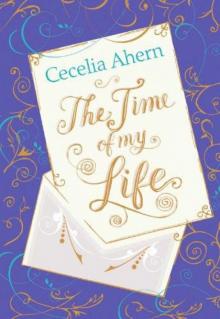 The Time of My Life
The Time of My Life Lyrebird
Lyrebird Girl in the Mirror
Girl in the Mirror Perfect
Perfect One Hundred Names
One Hundred Names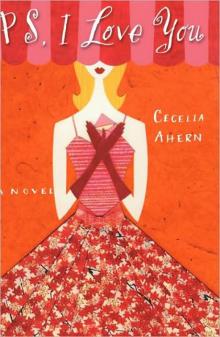 PS, I Love You
PS, I Love You Flawed
Flawed The Book of Tomorrow
The Book of Tomorrow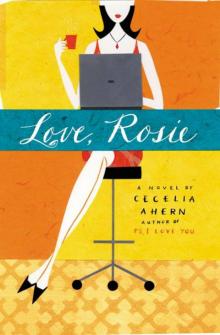 Love, Rosie
Love, Rosie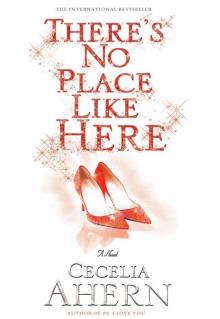 A Place Called Here
A Place Called Here How to Fall in Love
How to Fall in Love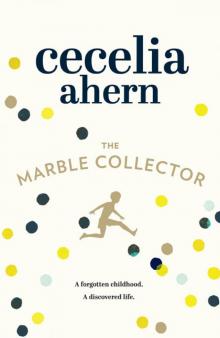 The Marble Collector
The Marble Collector Postscript
Postscript The Gift
The Gift Thanks for the Memories
Thanks for the Memories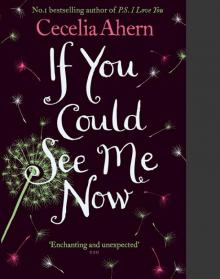 If You Could See Me Now
If You Could See Me Now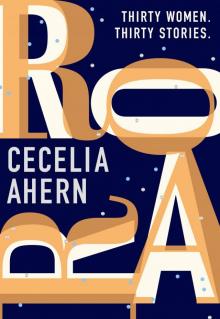 Roar
Roar Cecelia Ahern 2-book Bundle
Cecelia Ahern 2-book Bundle Girl in the Mirror: Two Stories
Girl in the Mirror: Two Stories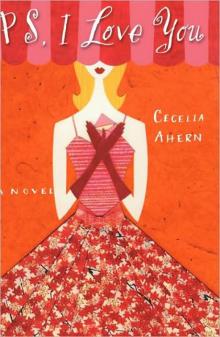 PS, I Love You: A Novel
PS, I Love You: A Novel Cecelia Ahern Short Stories
Cecelia Ahern Short Stories There’s No Place Like Here
There’s No Place Like Here